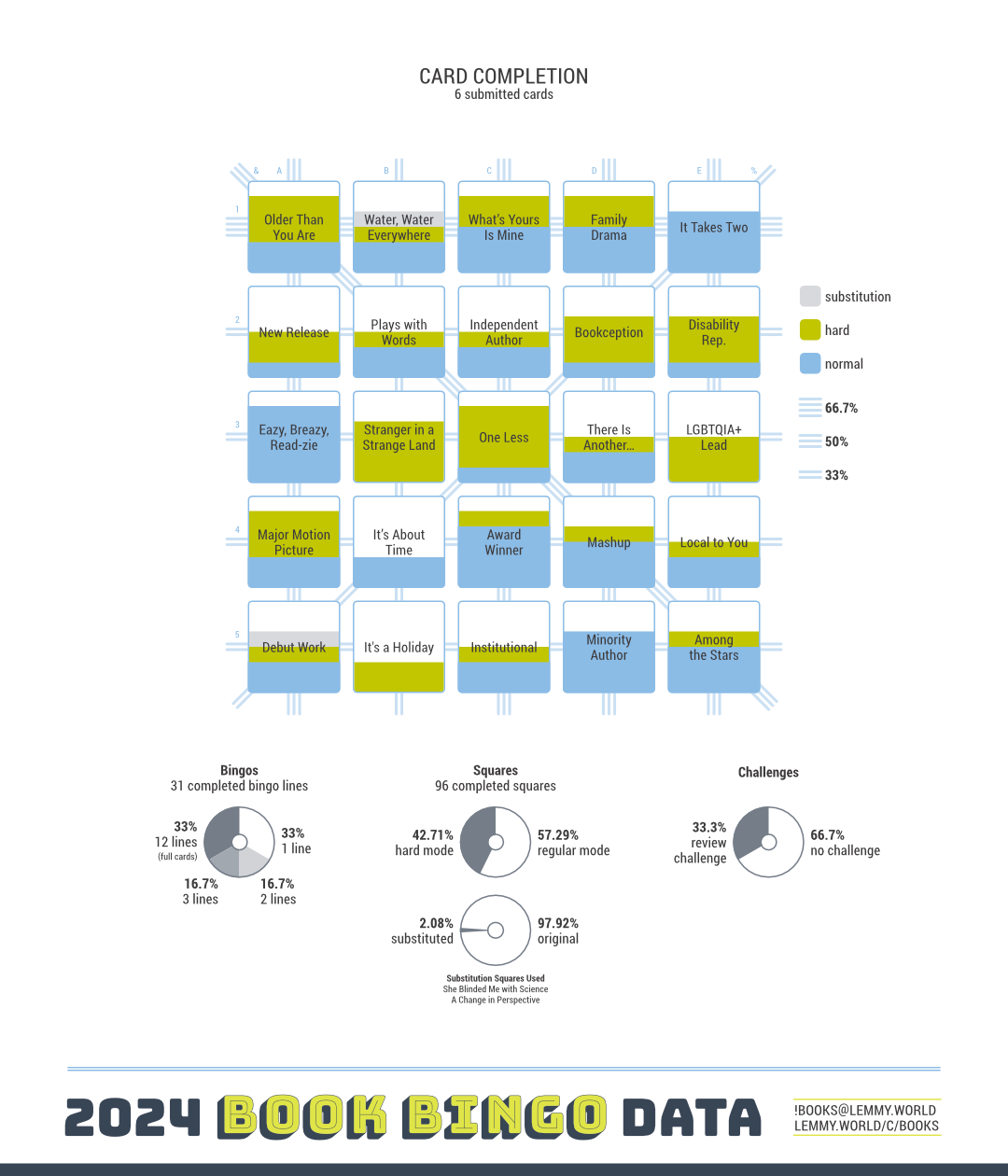We said we’d post the stats from last year’s bingo, so here’s the breakdown!
Submissions are included in the stats as they were reported. In other words, while we do verify that works exist (as a side effect of compiling reading stats), we don’t check if they “count”.
What got completed?

Cards
- 6 cards submitted (1 card per person) Not bad for a niche first-time event on the fediverse!
- 2 challenge modes completed (review mode, by 2 people)
Bingo Lines
- 31 bingo lines completed
- 2 cards with 12 bingos done (“blackout”/all squares)
- 1 with 3 bingos
- 1 with 2 bingos
- 2 with 1 bingo
- most popular bingo (on 66.7% of cards): row 1
Squares
- 96 squares completed
- most completed squares (on 83.3% of cards): 1A (Older Than You Are), 1C (What’s Yours Is Mine), 1D (Family Drama), 3A (Eazy, Breazy, Read-zie), 3C (One Less), 4A (Now a Major Motion Picture), 4C (Award Winner)
- least completed squares (on 33.3% of cards): 4B (It’s About Time), 5B (It’s a Holiday)
- least favorite square, according to survey: 2B (Plays with Words)
- 41 hard mode squares (42.71% of completed squares)
- most completed hard modes (on 66.7% of cards): 3B (Stranger in a Strange Land), 3C (One Less)
- hard modes nobody did: 1E (It Takes Two, three authors), 3A (Eazy, Breazy, Read-zie, read on vacation), 4B (It’s About Time, backward in time), 5D (Minority Author, ethnic minority and LGBTQIA+)
- squares submitted only in hard mode: 3B (Stranger in a Strange Land), 3E (LGBTQIA+ Lead), 5B (It’s a Holiday)
- 2 substituted squares (2.1% of completed squares)
- 33.3% of cards included a substitution
- substitutions made: 1B > She Blinded Me with Science, 5A > A Change in Perspective
What did people read?

Types of Works
- 93 unique works read
- 68 fiction novels (73.1% of unique works)
- 14 fiction novellas (15.1%)
- 3 fiction or nonfiction short stories or short story collections (3.2%)
- 3 fiction or nonfiction comics, graphic novels, or manga (3.2%)
- 3 verse works (epic poems, novels in verse, or dramatic verse) (3.2%)
- 2 nonfiction biographies or memoirs (2.2%)
Publication Years
- before 1900: 3 (3.2% of unique works)
- 1900–1909: 2 (2.2%)
- 1910–1919: 0
- 1920–1929: 4 (4.3%)
- 1930–1939: 0
- 1940–1949: 0
- 1950–1959: 5 (5.4%)
- 1960–1969: 5 (5.4%)
- 1970–1979: 3 (3.2%)
- 1980–1989: 2 (2.2%)
- 1990–1999: 4 (4.3%)
- 2000–2009: 5 (5.4%)
- 2010–2019: 30 (32.3%)
- 2020–2024: 30 (32.3%)
Notable Content Tags
Works may be in multiple categories/subcategories. A space detective thriller would be counted once for each of the following tags: space, scifi, fantastical, mystery/detective, thriller, and suspenseful.
- fantastical: 62 (66.7% of unique works)
- scifi: 22 (23.7%)
- space: 8 (8.6%)
- supernatural: 11 (11.8%) Surprisingly, not all supernatural titles were also horror.
- dystopian: 6 (6.5%)
- epic fantasy: 5 (5.4%)
- magical realism: 4 (4.3%)
- scifi: 22 (23.7%)
- suspenseful: 45 (48.4%)
- mystery/detective: 20 (21.5%)
- horror/gothic: 18 (19.4%)
- thriller: 16 (17.2%)
- historical: 21 (22.6%)
- romantic: 16 (17.2%) Includes a significant romantic element; does not need to be in a romance genre.
- literary/contemporary: 16 (17.2%)
- YA/middle grade: 8 (8.6%)
- nonfiction: 4 (4.3%)
Most Read Titles (2 each)
- The Butcher of the Forest by Premee Mohamed
- Relic by Douglas Preston & Lincoln Child
- The Scarlet Pimpernel by Baroness Emmuska Orczy
Most Read Authors (2 each)
- Ray Bradbury
- Becky Chambers
- Mareike Fallwickl
- Nnedi Okorafor
- J.R.R. Tolkien


‘Fantastical’ includes pretty much anything with a speculative element, so fantasy, scifi, post-apocalyptic stuff, magical realism, cli-fi, mythology, supernatural stuff, etc. (Note to self: design the tags diagram more clearly next time.) It’s kind of a big lump of a tag (suggestions welcome for next year!), but when I tried making the top-level categories more specific, it got significantly harder to classify a work into just a couple tags or figure out where subcategories belonged.
I wonder if “Speculative Fiction” wouldn’t be a better category?
Probably (except without the “fiction” part). I feel like there was a reason I didn’t call it that, but I don’t remember why. I’ll make a note!
I was thinking that because it’s already an established overhead term for those genres. https://en.wikipedia.org/wiki/Speculative_fiction
It may have been because I chose to make ‘horror’ a subcategory of ‘suspenseful’, since there’s plenty of horror that doesn’t have speculative elements.